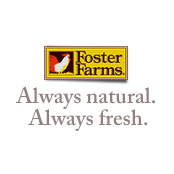
At Foster Farms, the safety and quality of our poultry products are our highest priorities. We realize that the current news about Avian Influenza (H5N1) may have you concerned and seeking good information. For your reassurance and interest, we have answered frequently asked questions about Avian Influenza below. We are also available to respond to your questions through our hotline, 1-800-255-7227, and to provide you additional resources for further research.
There are many different strains of influenza, all generally specific in their ability to infect animals, birds, or humans. The strain of Asian bird influenza that has been in the news, H5N1, is a highly pathogenic form of avian influenza that does not currently, nor has it ever, existed in the United States. At Foster Farms, we treat any potential threat to our flocks very seriously and have stringent bio-security plans in place to protect our birds from the introduction of any disease, including any form of avian influenza. Our poultry husbandry programs and procedures are far more modern and sophisticated than the poultry practices used in the villages of Asia, where the virus first appeared. However, because we take any threat to health and well being of our poultry seriously, Foster Farms is working closely with our poultry industry partners, animal and human health agencies in the state to monitor birds in California as well as throughout United States for any sign of the virus. In the unlikely event of an introduction of H5N1 into the United States, the early detection and quick response systems developed through this cooperation will protect our flocks and provide quick control of the virus.
"Bird Flu" is the common name for a specific avian influenza virus, H5N1, plaguing Asia at this time. It is a respiratory disease of birds that is caused by the virus. Influenza viruses are, by nature, species-specific i.e. avian viruses infect birds, human viruses infect people. There have been rare occasions when humans have been infected after having very close physical contact with infected birds.
There are several different types of avian influenza. The milder forms occur routinely around the world just as human influenza occurs yearly. The more serious form is termed Highly Pathogenic Avian Influenza (HPAI) because the disease is much more severe in birds, and it results in high mortality in poultry flocks. The bird flu occurring right now in Asia is an HPAI virus identified as H5N1.
Of the millions of people potentially exposed to the virus throughout Asia only a small number have been infected, and those by direct contact with infected live birds. Thus the threat of humans catching the disease directly from other humans is at this time quite rare, if not non-existent, because the virus in its current form has not changed into one that could easily be contracted by humans.
The form of the avian influenza virus that could cause a pandemic does not exist today anywhere in the world. The "bird flu" H5N1 virus would have to mutate or change significantly from what it is today to gain the ability to cause a pandemic. As deadly as it is to poultry in Asia today, it cannot cause a pandemic in its current form.
Experts agree that if a human pandemic were to occur from this disease, the most likely source of transmission would be from human-to-human contact most likely occurring through difficult-to-control, international travel.
It is possible for a human to acquire the H5N1 HPAI virus from another infected human if there is extremely close contact. However, scientists say that the virus has not yet developed the ability to pass easily from human to human, and human-to-human transmission is extremely unlikely.
No. Health agencies throughout the world agree it is not possible to get Avian Influenza from eating properly prepared poultry.
No. The avian influenza virus that is infecting flocks in Asia does not exist in the U.S., nor has it ever. All Foster Farms products are grown locally throughout the West Coast on farms that we watch over closely to ensure the safety of each bird. Because avian influenza H5N1 has never existed in the U.S., our poultry products have not ever been exposed to this virus.
No. Foster Farms poultry products are always grown locally on farms in the United States.
No. Foster Farms birds have never been exposed to the H5N1 virus and the company has stringent biosecurity safeguards in place to protect their birds from an unlikely introduction.
More importantly the United States does not have the H5N1 HPAI virus and does not import poultry from the countries where known outbreaks of AI have occurred.
Foster Farms makes every effort to protect its birds from introduction to any disease. The company's animal welfare and preventative health programs are among the best in the industry, and the company continuously updates its procedures to assure that its birds are well-protected and treated.
Foster Farms is always vigilant in its own systems to detect and prevent avian diseases from wherever they may originate. To further protect the health of its poultry and ensure the safety of its products, Foster Farms has long employed strict and increasingly sophisticated practices on its farms based on the following bio-security principles:
Isolation of poultry farms - poultry flocks are isolated from all other animals during the entire time they are grown on the farm. Waterfowl and other wildlife are prevented from entering any poultry houses. Workers raising the poultry wear protective and sanitized clothing.
Traffic Control - in order to prevent outside contamination, only necessary traffic is allowed to enter premises where poultry are present. Only authorized personnel under controlled circumstances may visit both the farms and the processing plants.
Sanitation - all equipment and vehicle traffic entering farms are cleaned and disinfected upon entry and exit.
Care - a highly nutritious and complete feeding program designed by a specialist in poultry nutrition, along with clean, sanitary drinking water are continually available to promote good health. The most modern husbandry practices and housing restrict the exposure of birds to poultry pathogens such as Avian Influenza. Two veterinarians, board-certified in poultry medicine, are employed full time by Foster Farms to ensure the highest level of biosecurity is maintained and preventative health programs are in place to optimize flock health.
Depopulation and eradication - in the unlikely event that a flock is exposed to significant disease, the farm site would be immediately quarantined and controlled with the assistance and guidance of the USDA, state agricultural officials, and local agencies. Any disposal of infected birds would involve humane euthanasia guidelines and they would not be used for human consumption. A new flock of birds would not be reintroduced to the farm until it was thoroughly cleaned, disinfected, and tested for the presence of the virus by USDA.
Foster Farms is committed to providing premium quality poultry products that are healthy, delicious and safe.
Foster Farms' avian medicine specialists have a regular and consistent program of testing to ensure flock health. Poultry flocks raised by Foster Farms are blood tested for avian influenza before they are processed.
If you would like to find out more about avian influenza, these sites may also be of interest:

